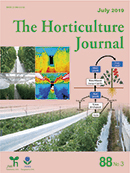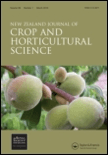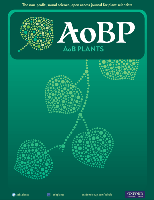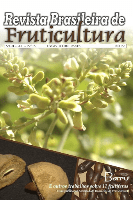
Horticulture Journal
Scope & Guideline
Pioneering Insights in Horticulture and Beyond
Introduction
Aims and Scopes
- Plant Genetics and Breeding:
Research related to the genetic improvement of horticultural crops, including the identification of quantitative trait loci, genetic markers, and breeding strategies to enhance desirable traits. - Physiology and Biochemistry of Plants:
Studies exploring the physiological processes in plants such as growth responses, nutrient uptake, and the effects of environmental factors on plant development. - Postharvest Technology:
Investigations into techniques and treatments that extend the shelf life and quality of horticultural products after harvest, including the use of growth regulators and storage conditions. - Crop Management and Cultivation Techniques:
Research focused on optimizing cultivation practices, including irrigation, fertilization, and pest management to improve yield and quality of horticultural crops. - Environmental Stress Responses:
Studies examining how horticultural crops respond to abiotic stresses such as temperature extremes, drought, and nutrient deficiencies, and strategies to enhance resilience. - Ornamental Horticulture:
Research dedicated to the genetic and environmental factors influencing the quality, longevity, and aesthetic value of ornamental plants, including flowers and landscaping plants.
Trending and Emerging
- Sustainable Agriculture Practices:
Increased focus on sustainable practices, including organic farming, water conservation techniques, and soil health management, reflecting a growing awareness of environmental impacts and the need for sustainable food production. - Genomic and Molecular Approaches:
A notable trend toward utilizing genomic tools and molecular biology techniques to understand plant traits, improve breeding efficiency, and enhance crop resilience against diseases and environmental stress. - Climate Resilience in Horticulture:
Research addressing the impacts of climate change on horticultural crops, including studies on heat tolerance, drought resistance, and adaptation strategies that enhance crop viability under changing climatic conditions. - Functional Food and Nutraceutical Development:
An emerging interest in the nutritional aspects of horticultural products, particularly those with bioactive compounds that promote health benefits, aligning with the global trend towards health-conscious consumption. - Technological Innovations in Horticulture:
A rise in research focused on technological advancements such as precision agriculture, smart greenhouse technologies, and automated cultivation systems that enhance productivity and efficiency.
Declining or Waning
- Traditional Pest Management Approaches:
Research on conventional pest control methods has decreased, possibly due to the increasing emphasis on integrated pest management and sustainable practices that utilize biological controls and reduced chemical applications. - In-depth Taxonomic Studies of Lesser-Known Species:
There appears to be a reduction in research focused on the taxonomy and classification of less commercially viable or lesser-known horticultural species, as attention shifts toward economically important crops. - Static Cultivar Studies:
The focus on static studies of specific cultivars without considering broader genetic diversity and adaptability has waned, highlighting a shift toward more dynamic research that incorporates genetic variability and breeding for resilience.
Similar Journals

Journal of Horticultural Sciences
Elevating Horticultural Insights for Tomorrow's Challenges.The Journal of Horticultural Sciences, published by the Society for Promotion of Horticulture (SPH) in India, serves as a vital platform for the dissemination of research in horticulture and related fields. With an ISSN of 0973-354X and an E-ISSN of 2582-4899, this open-access journal has been committed to advancing horticultural knowledge since 2006, allowing researchers to share their findings widely and facilitate significant advancements in the discipline. The journal's influence is reflected in its current category quartile rankings, designated as Q4 in Ecology, Evolution, Behavior and Systematics, Horticulture, and Plant Science for 2023, illustrating its developing reputation within the academic community. It is important to note the journal's Scopus ranking in the field, where it ranks #111 in Horticulture and #709 in Ecology, marking it as a niche publication with potential for growth. As it converges years from 2019 to 2024, this journal aims to further engage scholars, professionals, and students by focusing on innovative research and breakthroughs in horticultural sciences, thus contributing to the global discourse in sustainable agriculture and environmental stewardship.

EUROPEAN JOURNAL OF HORTICULTURAL SCIENCE
Fostering dialogue on contemporary horticultural advancements.The European Journal of Horticultural Science, an esteemed publication of the International Society for Horticultural Science (ISHS), serves as a pivotal platform for advancing the field of horticulture since its inception in 2003. With its base in Germany, this journal occupies a significant position in the Q3 quartile of horticultural research, confidently ranked #60 out of 115 in the Agricultural and Biological Sciences category on Scopus, reflecting its relevance and impact within the scholarly community. The European Journal of Horticultural Science fosters open access to a wealth of research and insights, facilitating knowledge sharing among researchers, professionals, and students dedicated to the innovative and sustainable practices in horticultural science. As it embarks on a new chapter through its convergence years leading up to 2024, the journal aims to enhance the dialogue on contemporary horticultural challenges and advancements, making it an essential resource for those seeking to contribute to and learn from ongoing developments in this vital field.

Ornamental Horticulture-Revista Brasileira de Horticultura Ornamental
Cultivating Knowledge in Ornamental HorticultureOrnamental Horticulture - Revista Brasileira de Horticultura Ornamental, published by the SOC BRASILEIRA FLORICULTURA & PLANTAS ORNAMENTAIS, serves as a premier platform for disseminating high-quality research in the field of ornamental horticulture. With an Open Access model in place since 1995, this journal ensures that valuable findings in horticultural science reach a wide audience, fostering greater collaboration within the global community. Based in Brazil, this journal primarily focuses on the cultivation, management, and improvement of ornamental plants, contributing significantly to both the scientific and practical aspects of the horticulture industry. It has achieved esteemed rankings, including being classified in the Q2 quartile for Horticulture and Q3 for Plant Science in 2023, demonstrating its academic rigor and relevance. Scopus ranks it at 54th in Horticulture and 278th in Plant Science, positioning it among leading scholarly resources in these fields. The journal is committed to advancing knowledge through innovative research that aids in the sustainable development of ornamental horticulture practices.

Journal of Berry Research
Advancing Knowledge in Berry Health and InnovationJournal of Berry Research, published by IOS PRESS, is an essential scholarly platform that addresses a wide array of topics related to the health benefits, cultivation, and innovation surrounding berry species. With an ISSN of 1878-5093 and an E-ISSN of 1878-5123, this journal has successfully carved a niche in various interdisciplinary fields, achieving notable rankings in its respective categories, including Q2 in Agronomy and Crop Science and Q3 in Biochemistry and Food Science as of 2023. The journal not only serves as a repository of rigorous research but also facilitates the exchange of knowledge among researchers, professionals, and students invested in agronomy, horticulture, and plant science. The HIndex reflects its growing impact within these disciplines. Set against the backdrop of the Netherlands since its inception in 2010, the Journal of Berry Research continues to provide cutting-edge insights, making it a pivotal resource for those pursuing advances in berry research and its associated fields.

NEW ZEALAND JOURNAL OF CROP AND HORTICULTURAL SCIENCE
Advancing Agricultural Insights for a Sustainable FutureThe New Zealand Journal of Crop and Horticultural Science, published by Taylor & Francis Ltd, stands as a key resource in the fields of Agronomy and Horticulture, with a commendable impact factor reflecting its quality and influence in the scientific community. Since its inception in 1989, this journal has been committed to advancing our understanding of crop development and horticultural practices, catering not only to researchers and professionals but also to students eager to delve into the intricacies of plant sciences. With a Q3 ranking in both Agronomy and Crop Science and Horticulture as of 2023, the journal occupies a significant position within the agricultural and biological sciences domain, significantly contributing to the body of knowledge in these fields. The journal features original research, reviews, and technical notes that cover a wide range of topics, ensuring a comprehensive perspective on contemporary and emerging agricultural issues. For individuals interested in accessing cutting-edge research, the journal provides subscription-based access, further enhancing its scholarly contributions.

JOURNAL OF PLANT BIOCHEMISTRY AND BIOTECHNOLOGY
Nurturing Sustainable Practices through Plant Science ResearchJOURNAL OF PLANT BIOCHEMISTRY AND BIOTECHNOLOGY, published by SPRINGER INDIA, is a leading publication dedicated to advancing research in the fields of plant biochemistry, biotechnology, agronomy, and crop science. With an ISSN of 0971-7811 and E-ISSN 0974-1275, the journal encompasses a wide range of studies aimed at enhancing our understanding of plant biological processes and their applications in agriculture and biotechnology. It has achieved a noteworthy Q2 ranking in Agronomy and Crop Science and Plant Science, as well as a Q3 ranking in Biotechnology, reflecting its quality and relevance in contemporary research. Notably, the journal ranks #166 in Plant Science and #133 in Agronomy, both falling in the top 67th percentile. With a rich history spanning from 1992 to 2024, the journal is committed to providing open access to innovative research findings that bridge the gap between laboratory discoveries and their practical applications in sustainable agriculture. Researchers, professionals, and students will find a wealth of knowledge and inspiration to advance their work in the dynamic field of plant sciences at this esteemed journal.

AoB Plants
Unlocking the potential of plants for future generations.AoB Plants is a distinguished open-access journal published by Oxford University Press, dedicated to advancing the field of plant science. Since its inception in 2009, this journal has played a pivotal role in disseminating high-quality research that encompasses a wide range of topics including plant biology, ecology, and biotechnology. With an impressive impact factor and a ranking in the Q1 quartile for Plant Science, AoB Plants is recognized for its innovative contributions and scholarly rigor, ranking #129 out of 516 in the Scopus Agricultural and Biological Sciences category, placing it in the 75th percentile among its peers. By promoting open-access availability of research findings, the journal empowers researchers and practitioners alike, facilitating greater collaboration and knowledge sharing in the global scientific community. Situated in the heart of the United Kingdom, AoB Plants continues its commitment to providing a platform for pioneering research and developments in plant science, thus fostering a deeper understanding of the crucial roles that plants play in our ecosystems and economies.

Revista Brasileira de Fruticultura
Exploring Brazil's Rich Agricultural HeritageRevista Brasileira de Fruticultura, published by the Sociedade Brasileira de Fruticultura, is a leading scholarly journal dedicated to the advancement of research in the fields of agronomy, crop science, food science, horticulture, and plant science. With an impressive Open Access model adopted since 2001, the journal is committed to disseminating high-quality research from Brazil and beyond, promoting innovation and collaboration among researchers, professionals, and students alike. The journal currently holds a respectable Q3 category ranking in multiple fields as of 2023, reflecting its significance within the scientific community, specifically ranked #72 in horticulture and #257 in agronomy, among its peers. The Revista Brasileira de Fruticultura not only serves as a platform for original research articles, reviews, and case studies but also emphasizes practical applications and sustainable practices in fruit cultivation. Its aim is to enhance the visibility of Brazilian fruit research on a global scale, making it an invaluable resource for those invested in advancing horticultural sciences.

Erwerbs-Obstbau
Advancing Horticultural Science Through Innovation.Erwerbs-Obstbau is a pivotal journal dedicated to the field of horticulture, focusing on research concerning the cultivation and production of fruit. Published by Springer in Germany, this journal plays a crucial role in disseminating innovative findings and advancing the knowledge base within the agricultural and biological sciences landscape. With an impact factor that places it in the Q3 category of horticultural journals, it ranks #68 out of 115 in its field according to Scopus, demonstrating its relevance and contribution to ongoing debates and advancements in horticulture practices. Researchers, professionals, and students benefit from the insights and developments shared in its pages, as the journal has been successfully converging data and insights since its inception in 1983, including continuous contributions from 1996 to the present. Although the journal currently does not offer Open Access, its comprehensive articles are invaluable for anyone invested in the science of fruit cultivation and production.

BANGLADESH JOURNAL OF BOTANY
Bridging Science and Conservation in Plant StudiesBANGLADESH JOURNAL OF BOTANY is a prominent publication in the field of plant sciences, dedicated to advancing research and knowledge within the botanical community. Published by the BANGLADESH BOTANICAL SOC, this journal serves as a vital platform for researchers and scholars seeking to disseminate their findings related to plant biology, ecology, and conservation practices, particularly within the unique context of Bangladesh's diverse flora. With an ISSN of 0253-5416 and an E-ISSN of 2079-9926, the journal encompasses a wide scope of topics, reflecting interdisciplinary approaches in botanical research. Since its inception, with convergence periods from 1996 to 2001 and from 2003 to 2024, it has garnered recognition, positioned in the Q4 category in the Plant Science field with a ranking of #459/516 in Scopus, indicating its contribution to the field despite its developing impact. Operating within Bangladesh, at the UNIV DACCA DEPT BOTANY, the journal provides a crucial insight into the ecological and agricultural implications of plant studies in the region, catering to the needs of academics, professionals, and students eager to engage with contemporary botanical research.